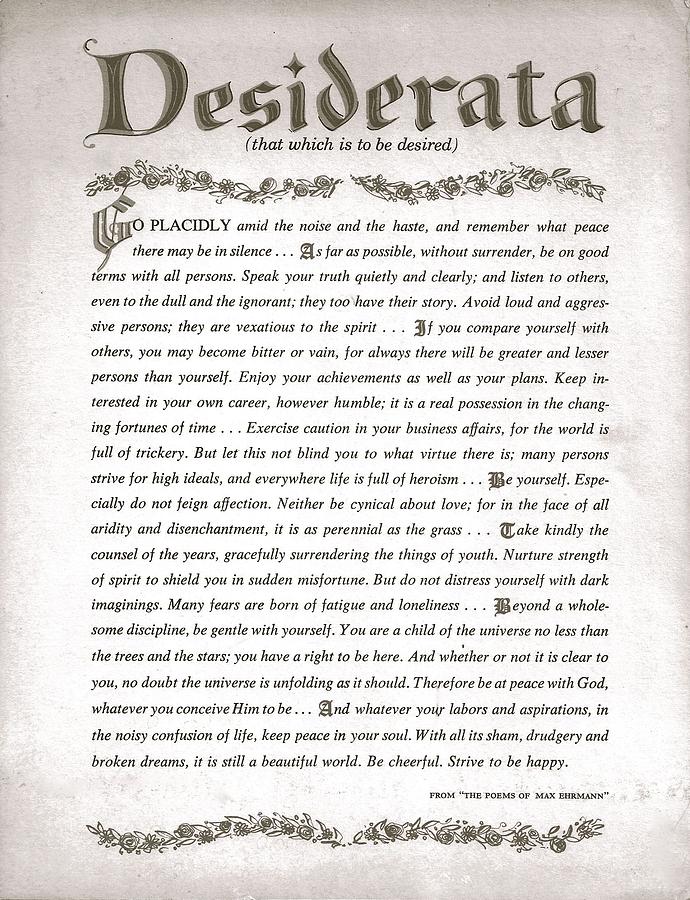Desiderata: A Poem for Dark Times
I am not what one would call a poetry expert. I have read a bit of poetry here and there, and even dabbled in it as an emotionally tortured teenage. But for some reason it can never quite seem to hold my attention, no matter how many times I attempt to get into it. For the most part, I gravitate towards those poems that give me some kind of inspiration.
Works like If by Rudyard Kipling, and Invictus by William Ernest Henley are useful tools. These poems give me the little extra push that I need when I find myself losing motivation and drive. Simple, artfully constructed lines that I’ve burned into my memory give me the help I need to, for example, “hold on when there is nothing in you.” However, when I feel truly lost, I turn to Max Ehrman’s Desiderata.

The poem, which loosely translates to “desired things,” or “that which is to be desired,” is 46 lines of unrhymed prose that seems fairly unremarkable upon first glance. Like the often lampooned “Live, Laugh, Love,” signs available in your local Target, it appears to be a collections of aphorisms haphazardly strung together. However to me, it is something much more than this. In fact I would argue that it represents a world-view that is sorely needed in today’s day and age.
Ehrmann begins his poem with a simple phrase, “Go placidly amidst the noise and haste/and remember what peace there may be in silence.” This line sets the tone for the rest of the understated piece. In today’s culture we romanticize the loud and the grandiose, and gravitate towards the people who are shouting the loudest. These things catch our attention, and so we give them greater value. Celebrity is idolized, and fame is deeply coveted. In this age of social media, we engage in a daily struggle to vie for the most likes and views, desperate to be acknowledged.
We are surrounded by voices pulling us in a thousand different directions. “Buy this.” “Watch that.” “Did you see what he did!?” “Did you hear what she said!?” “Bullshit.” “Liar.” “Sad.” “Look at me.” “LOOK AT ME.” The temptation to add our voice to the din is overwhelming.
We want to make our voices heard, to have them acknowledged and respected. Too often we are so desperate to receive love and admiration from others that we forget to be at peace with ourselves. To do so, we have to step away from these voices and be alone with ourselves. We have to embrace silence.
Today’s media, and it seems our entire political discourse, has been swallowed up by rage and spite. Pundits and news sources from all sides feed off of our loathing and disgust. They want to make us angry, to make us afraid. But when we allow them to control us, when we feed these ratings-hungry parasites, we only make them stronger. We take to our keyboards and spout our mutual dislike for those who don’t agree with us, yet nothing gets accomplished. We have at best just thrashed about, looking for someone to hurt.

“Avoid loud and aggressive persons,” Desiderata reminds us, “They are vexations of the spirit.” Ehrmann let’s us know that we have the choice, and the power, to ignore those who try to incite us to anger. By allowing these forces to influence our thinking, we surrender this power over to them. We can take it back only by choosing to not engage with them. Yet this doesn’t mean that we should despise them. We are encouraged to “Listen to others/Even the dull and the ignorant/They too have their story.” It is a gentle, understanding message that allows us to disregard the spiteful while acknowledging their humanity. This gentleness is at the heart of Desiderata.
Ehrmann encourages us to be kind and understanding, but not to give other people power over our minds and our happiness. It’s an almost stoic mentality, calmly accepting the actions of others, but never allowing them to harm us. He advises us to “nurture strength of spirit to shield you in sudden misfortune/but do not distress yourself with dark imaginings.” We can be as happy as we choose to be. There is no sense in causing ourselves pain by obsessing over the grim possibilities of what might be. This is just another way of giving up power over one’s happiness.
I know that up until this point I have sounded rather critical. But I am not trying to throw stones at the modern world. I am a product of my time as much as anyone else is, and I am tremendously glad to live where and when I do. The reason that I love this poem is that it provides me with the tools that I need to navigate this world, and remember what is really important.
I have always been a self-critical person. I’m never satisfied with who I am or what I’ve done, in any aspect of my life. As my manager recently told me, “You know that you are your harshest critic.” I don’t necessarily think that this is a bad thing. It keeps me from becoming complacent, and forces me to strive to do better to quiet my own negative thoughts. Still, there are still times when I feel overwhelmed by my own failings. When this mood strikes me, I think of the lines from Desiderata:
“Beyond a wholesome discipline,
Be gentle with yourself.
You are a child of the universe, no less than the trees and the stars;
You have right to be here.”
This reminds me that discipline is essential, and that it is healthy to be hard on one’s self from time to time. However, Hermann also encourages us to extend the same kindness that we show to other people to ourselves. It only seems fair. Sometimes we can seem wholly unprepared for what life has thrown in our way. It is overwhelming, even terrifying. Yet when we feel most vulnerable, Ehrmann reminds us that:
“Whether or not it is clear to you,
No doubt the universe is unfolding as it should.”
It is this simple, persistent optimism that I believe makes Desiderata so special. Ehrmann recognizes the problems in the world, and acknowledges the challenges that lay ahead for his readers. “The world is full of trickery,” but that does not mean that it is without merit. He assures us that we can and will persist, that we are strong enough to face these challenges and rise above them. Even when things seem darkest, we still have hope, and we still have each other. Love is all around us, and he notes that, “in the face of all aridity and disenchantment, it is as perennial as the grass.”

It seems that there is a lot of doubt in the world right now, particularly in the United States. We are politically divided and diametrically opposed on any number of issues. It is easy to grow depressed and disillusioned when we believe that things look bleak. When these moments hit me, I look to the print out of Desiderata hanging next to my desk. It is a simple little poem, with a simple little message. But sometimes simple, little messages are the most important ones. And I quote:
“With all its sham, drudgery, and broken dreams,
it is still a beautiful world.
Be cheerful.
Strive to be happy.”
PS: This is, in my opinion, the best artistic representation of Desiderata by Gavin Aung Than of Zenpencils.com. I wrote him an email once and he was kind enough to respond. It only seems fair that I give him some credit.
http://zenpencils.com/comic/desiderata/

Leave a comment